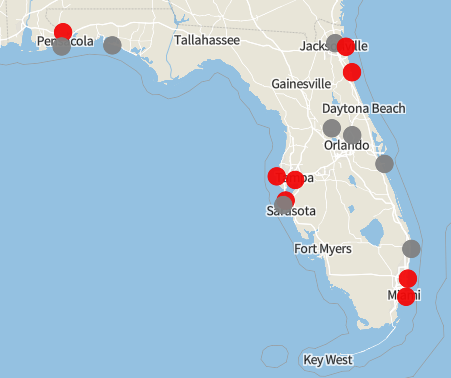By Mia McCormick, Environment Florida
Plastic pellets, or nurdles as they are sometimes called, are shipped all over the world to manufacturing facilities where they are melted and molded into common items like sunglasses or flower pots. These pellets are often spilled in transport or released by the facilities that process them during cleanup or loading. They end up in our waterways, on our beaches and inside the bellies of our wildlife.
The problem is recognized worldwide. An estimated 10 trillion pellets are dumped into our oceans each year, making it the second-largest source of marine microplastic pollution by weight.
Our patrol and what we found

Environment Florida Research & Policy Center held a series of plastic pellet patrols in six regions across the state this summer. We teamed up with some other ocean loving groups like the Clearwater Marine Aquarium, Saturdays are for the beach and Keep Brevard County Beautiful to host cleanups and look specifically for plastic pellet pollution. We held 16 patrols and found pellets at eight locations.
We have a strong theory about the source of the plastic pellets in some locations. A large spill was found just 1 mile away from the Ascend Performance Manufacturing Facility in Cantonment in the Florida Panhandle. That facility produces pellets according to our map of plastic-producing facilities. The spill was located near a railroad track that runs parallel to the factory. We gathered 1,515 pellets after 20 minutes of cleaning up. However, that was only a small part of the spill.
How the pellets arrived on the beach at Anastasia State Park near St. Augustine or on Virginia Key near Miami is more of a mystery. There are rivers that flow into the bodies of water near both of these locations and Virginia Key is across from the Port of Miami. Many times pellets are shipped to locations by boat or transported by railway or truck and it’s not uncommon for them to be spilled in the process. But it can be prevented.
Stopping pellet pollution
The most effective way to stop plastic pellet pollution is to limit buying things made of plastic. Less demand leads to less production. That can be difficult in today’s world where plastic is the most readily available material choice.
There is also proposed legislation that will make it illegal to dump the pellets and provide some regulations around packing them that aim to reduce pollution. We are encouraging congressional leaders to support the Plastic Pellet Free Waters Act. As of Oct. 11 the bill has bipartisan support from 85 cosponsors, only three are from Florida. Reps. Darren Soto, Kathy Castor and Jared Moskowitz have all cosponsored the bill.
Our summer of patrols shows that plastic pellet pollution is showing up in Florida at the places where we love to swim and wildlife thrive. We need more Florida leaders to step up and support this act and others that make reducing plastic pollution a priority.
Banner photo: A hand holding plastic pellets (The Public Interest Network staff). This piece was originally published at https://environmentamerica.org/florida/resources/hunt-reveals-plastic-pellet-pollution-across-florida/.
Sign up for The Invading Sea newsletter by visiting here. To support The Invading Sea, click here to make a donation. If you are interested in submitting an opinion piece to The Invading Sea, email Editor Nathan Crabbe at ncrabbe@fau.edu.



